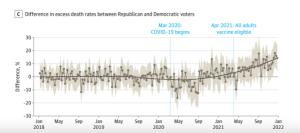A just-released study found striking differences in death rates from COVID based on political party affiliation.
The study reviewed “538,159 deaths in individuals aged 25 years and up in Florida and Ohio between March 2020 and December 2021…”
more from JAMA
“Between March 2020 and December 2021, excess death rates were 2.8 percentage points (15%) higher for Republican voters compared with Democratic voters…(Table)….political party affiliation became a substantial factor only after COVID-19 vaccines were available to all adults in the US.”
After April 1, 2021, when all adults were eligible for vaccines in Florida and Ohio, this gap widened…with excess deaths among Republican voters 43% higher than among Democratic voters.

(you can get a higher resolution view here)
What does this mean for you?
Take a step back and consider how it came to this.



Unsurprising Results
Thanks for the note Maria.
Hi Joe! Hope you are well. JAMA must be short on ideas as I don’t see the point of this study. It would seem that other data points like age, overall health, comorbidities, etc., would be a much more interesting report than political affiliation.
No one is dying due to their party affiliation. Additionally, given the limitations cited, I’d take this whole thing with a very large grain of salt:
Limitations
Our study has several limitations. First, there are plausible alternative explanations for the difference in excess death rates by political party affiliation beyond the explanatory role of vaccines discussed herein. Second, our mortality data, although detailed and recent, only included approximately 83.5% of deaths in the US and did not include cause of death. Although overall excess death patterns in our data are similar to those in other reliable sources, such as the Centers for Disease Control and Prevention National Center for Health Statistics data, it is possible that the deaths that our study data did not include may disproportionately occur among individuals registered with a particular political party, potentially biasing our results. In addition, the completeness of our mortality data may vary across states or time, potentially biasing our estimates of excess death rates. Third, all excess death models rely on fundamentally untestable assumptions to construct the baseline number of deaths we would expect in the absence of the COVID-19 pandemic. Fourth, because we did not have information on individual vaccination status, analyses of the association between vaccination rates and excess deaths relied on county-level vaccination rates. Fifth, our study was based on data from 2 states with readily obtainable historical voter registration information (Florida and Ohio); hence, our results may not generalize to other states.
Thanks for the note Brad.
Couple observations. The study authors didn’t say people were dying due to their party affiliation, rather there is a strong statistical correlation between party affiliation and excess death rates.
Re the other factors that would be much more interesting, those have been widely studied and reported on elsewhere – as well as here on MCM. When one sees a very strong correlation between a previously unknown- risk factor and mortality, it should be studied. That’s how we figured out cholera was communicated by bad sanitation, malaria by mosquitos, plague by fleas…
Re the limitations, I didn’t see any that negated the authors’ conclusions…if you have specific input as to what the confounding factors might be please share. again, the statistical correlation was quite strong.
Net is, there were far more excess deaths among older Republican voters than among the same age cohort of Democratic voters.
Why?
be well Joe
The inference here is that b/c of someone’s party affiliation, they were more likely to die, i.e., they were vaccine hesitant, anti-science (whatever Orwellian language you want to use), etc., versus the other party.
This is more COVID politicizing, which is divisive, trite and boring. We should be focused on the fact that a lot of people died b/c they were unhealthy and had comorbidities, not because they voted a certain way or had drawn specific conclusions about a vaccine.
Thanks again for the thoughtful observation.
This research identified a clear association between varied data points (remember multivariate regression from Stats?). The data clearly indicates higher excess death rates for Rs vs Ds in the post-vaccination phase of the pandemic. I don’t think that is arguable – it is – in your word – a fact.
As to why – or, cause and effect, that requires additional research. As I noted, there’s been a boatload of research into the other topics you raise; just search for covid on this blog to get a tiny sample.
I never said – nor did the authors – that individuals died because they voted a certain way or had drawn specific conclusions about a vaccine.
We – individuals and as a society – get better by confronting uncomfortable truths.
be well Joe
I repeat – why was the excess death rate so much higher?
Joe,
The death rates are not causally related to party affiliation. They are related to vaccination status despite what some may say. Vaccination status does correlate with political party. It’s not the direct correlation. It’s the indirect correlation that’s affecting the data.
Thanks for adding an actuary’s educated take on correlation Jeff.
be well Joe